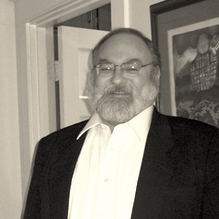 A good death
A good death From chasidic writers to hospice workers, there is a notion called, “a good death.” This seems to imply a death with dignity and without excessive pain. However, there are those who actually consider dying a mitzvah to be done with thought and intention. Perhaps it’s a bit chutzpahdik to write about “how” to do something while never having actually experienced it completely myself (unless one counts a near-death-experience), yet my hope is to provide some insight for the journey which all of us must face.
Judaism certainly values life, yet, there is an inevitable call by the Malach HaMavet (Angel of Death), which is inescapable, with the exception of a few notables, such as Elijah. Some of our Sages resorted to trickery to avoid the pain of death. For example, Rabbi Joshua asked the Malach to show him his place in paradise. The Malach agreed to take him there. Rabbi Joshua asked to hold the Malach’s knife so it would not frighten him on the way. When they arrived, Rabbi Joshua leaped over the wall into paradise, but the Malach could not follow. He was allowed to stay, but had to return the knife. Ket. 77b. That strategy only worked once, because when Rabbi Pappa asked to hold the knife, the Malach refused. However, the Malach did allow him an extra thirty days of life to put his affairs in order.
At the time of death the Kotzker was surrounded by his disciples and grieving family. He asked for some strong drink to wish a L’chayim (toast to life). He explained that “If G-d has willed my death, I am now performing G-ds will and it is proper to do so in a joyous spirit.” With the same rationale, another recorded custom is that certain saintly individuals calmly washed their hands before dying, as one would do preparing for a ritual. Beit Lechem Yehudah to Yoreh De’ah 338:1 in Lamm, N. “The Religious Thought of Hasidism.” YU Press, 1999, p. 490.
In another example, Rabbi Abraham Kook said of when his righteous ancestor Rabbi Isaac Katz (one of the Besht’s disciples) lay upon his deathbed he said, “Is it not written, ‘and she laughs at the last day’” (a verse from Proverbs 31:25)? So, in a spirit of joy, he asked for Shabbat candles to be lit and for musicians to play and sing to accompany his soul on its journey. Id.
In a drash on Beresheet (Genesis) from Rabbi Tzvi Elimelech of Dinov, he explains that “duty” of dying was incumbent upon Adam who was told that he must surely die (Gen. 2:17). It was a commandment given, not merely a prediction. As humans, we are also commanded. Since it is a mitzvah, one must invest one’s dying with kavanah (intention), and even as one does with other commandments – be joyful. Id. May the Holy One grant us the ability to carry such a positive attitude whenever our time to meet the Malach HaMavet arrives.
Rabbi ElizaBeth Beyer, R.N., M.S.N., M.S.J.S., M.R.S., J.D.
Rabbi Beth Beyer serves as spiritual leader for two synagogues. She is the founding rabbi of Temple Beth Or, Reno, which is dedicated to experiencing G-d, encouraging music, text study and promoting Jewish learning. For the past two years, she also serves as the rabbi at North Tahoe Hebrew Congregation. Her background includes working as a registered nurse, an attorney, mediator, and judge. She taught ethics at the University of Nevada, Reno and was the past Department Chair for Health Care Ethics at the Nevada Center of Ethics & Health Policy. She was ordained by the Academy for Jewish Religion in CA, received a Master’s Degree in Rabbinic Studies, a Master’s Degree in Jewish Studies from Spertus Institute of Jewish Studies, a Master’s Degree in Psychiatric Nursing from University of Maryland and law degree from the Nevada School of Law. She is licensed to practice law in Nevada. She is married to Dr. Tom Beyer, DC, a chiropractor. Rabbi Beyer has a strong commitment to working within the Jewish community and also working with interfaith groups.
___________
Gamliel Café
Gamliel Students are invited to a free informal online session, held monthly. On the third (3rd) THURSDAY of each month, different person(s) will offer a short teaching or share some thoughts on a topic of interest to them, and those who are online will have a chance to respond, share their own stories and information, and build our Gamliel Institute community connections. This initiative is being headed up by Rena Boroditsky and Rick Light. You should receive email reminders monthly. The next scheduled session of the Gamliel Café is July 19th, featuring Edna Stewart.
If you are interested in teaching a session, you can contact us at rboroditsky@jewisgh-funerals.org, rlight@jewish-funerals.org, or info@jewish-funerals.org.
____________________
Taste of Gamliel Series
The 2018 Taste of Gamliel series has concluded, but it is not too late if you want to access the recordings. You can Register for the 2018 series, Your’re Gonna Miss Me When I’m Gone: Jewish Practices of Remembrance, or any of the series from prior years. There are usually five sessions in a series, and each session is approximately 90 minutes.
Registration for Taste of Gamliel is mandatory to access the sessions. Registration is free, but there is a suggested minimum donation of $36 for each series to help us defray the out of pocket costs.
Those registered will be sent the information on how to connect to the sessions. To register, click here: register.
_______________
Gamliel Continuing Education Courses
Gamliel students should be on the lookout for information on a series of Gamliel Continuing Education Courses, advanced sessions focusing in on different topics. These will be in groups of three ninety minute sessions (three consecutive Wednesdays) offered twice yearly, with different topics addressed in each series. The goal is to look at these topics in more depth than possible during the core courses. The first course took place in Fall 2017, focusing on Psalms, and the second was on The World to Come and the Zohar.
The next course will be November 28th, December 5th, and December 12th. We will continue to look at death as seen in the Zohar, taught by Beth Huppin.
Registration is required, and there will be a tuition charge of $72 for each three session series. Contact us for information, by email info@jewish-funerals.org, or call 410-733-3700, or simply register online at www.jewish-funerals.org/gamreg/.
_____________________
Gamliel Course
The next course in the cycle of core courses offered by the Gamliel Institute will be Course 4 – Nechama/Comfort. It will be offered online during the Fall from October 9th to December 25th on Tuesday evenings, for 90 minutes each week for 12 weeks. The classes will begin at 5 pm PST/8 pm EST. Primary instructors will be Dan Fendel, Edna Stewart, with other guest instructors.
Registration is open – click here.
The course planned for Winter 2019 is Course 2 – Chevrah Kadisha: Taharah & Shmirah.
_____________________
DONATIONS
Donations are always needed and most welcome to support the work of Kavod v’Nichum and the Gamliel Institute, helping us to bring you the annual conference, offer community trainings, provide scholarships to students, refurbish and update course materials, expand our teaching, support programs such as Taste of Gamliel, the Gamliel Café, and the Gamliel Continuing Education courses, provide and add to online resources, encourage and support communities in establishing, training, and improving their Chevrah Kadisha, and assist with many other programs and activities. There is a matching donation program in progress so your dollars go further. See the website for details.
You can donate online at http://jewish-funerals.org/gamliel-institute-financial-support or by snail mail to either:
Kavod v’Nichum, or to The Gamliel Institute,
c/o David Zinner, Executive Director, Kavod v’Nichum,
8112 Sea Water Path,
Columbia, MD 21045.
Kavod v’Nichum and the Gamliel Institute] are recognized and registered 501(c)(3) organization, and donations may be tax-deductible to the full extent provided by law. Call 410-733-3700 if you have any questions or want to know more about supporting Kavod v’Nichum or the Gamliel Institute.
You can also become a member (Individual or Group) of Kavod v’Nichum to help support our work. Click here (http://www.jewish-funerals.org/money/).
___________
SUBMISSIONS WELCOME
Please note: this blog depends on you for content. Without you it cannot publish new material. If you have an idea for an entry you would like to submit to this blog, please be in touch. Email J.blair@jewish-funerals.org. We are always interested in original unpublished materials that would be of interest to our readers, relating to the broad topics surrounding the continuum of Jewish preparation, planning, rituals, rites, customs, practices, activities, and celebrations approaching the end of life, at the time of death, during the funeral, in the grief and mourning process, and in comforting those dying and those mourning, as well as the actions and work of those who address those needs, including those serving in Bikkur Cholim, Caring Committees, the Chevrah Kadisha, as Shomrim, funeral providers, in funeral homes and mortuaries, and operators and maintainers of cemeteries.
_____________________























 More news and opinions than at a Shabbat dinner, right in your inbox.
More news and opinions than at a Shabbat dinner, right in your inbox.